Samaaro + Your CRM: Zero Integration Fee for Annual Sign-Ups Until 30 June, 2025
- 00Days
- 00Hrs
- 00Min
MICE events—Meetings, Incentives, Conferences, and Exhibitions—play a vital role in shaping business strategies, fostering connections, and driving growth. Whether it’s launching a product, nurturing client relationships, or celebrating employee achievements, MICE events are significant investments of time, effort, and money.
But how do you know if these events are truly delivering value? Measuring return on investment (ROI) for MICE events has become crucial to understanding their impact and aligning them with broader business goals. In this blog, we’ll explore key metrics for evaluating MICE event ROI and how Samaaro, an AI-powered event marketing platform, can help you turn data into actionable insights.

To evaluate the ROI of MICE events effectively, it’s essential to identify and track key performance indicators (KPIs) that reflect their success across multiple dimensions.
Lead generation is often a primary objective of MICE events. By capturing attendee information and nurturing them through the sales funnel, businesses can create long-term value. Key metrics to track include:
For most businesses, the ultimate measure of success lies in the revenue generated. Sales-related KPIs include:
MICE events are also powerful tools for amplifying brand presence. Consider tracking:
While external stakeholders are crucial, the internal impact of MICE events shouldn’t be overlooked. Track metrics like:

Measuring the return on investment (ROI) for MICE (Meetings, Incentives, Conferences, and Exhibitions) events is essential for assessing their success and justifying future investments. Samaaro, an AI-powered event marketing platform, offers a comprehensive suite of tools and integrations to simplify and enhance the ROI measurement process. Here’s how Samaaro helps you maximize the value of your events:
Effective lead management is a cornerstone of ROI measurement, and Samaaro ensures no lead goes unnoticed.
Understanding the sales impact of an event is vital to calculating its financial ROI.
Samaaro simplifies brand awareness tracking by consolidating multiple data sources into a single platform.
Attendee engagement is a critical indicator of an event’s success, and Samaaro excels in providing actionable insights.
Samaaro makes it easier to analyze and communicate event outcomes with intuitive reporting features.
One of Samaaro’s standout features is its ability to integrate with multiple tools, creating a unified system for measuring ROI.
Samaaro not only helps you measure MICE event ROI but also provides actionable insights to optimize your strategies for future events. By combining advanced technology with a user-friendly interface, Samaaro is your partner in achieving measurable, data-driven success.

In today’s competitive landscape, MICE events are more than just networking opportunities—they’re strategic business tools. To maximize their value, measuring ROI isn’t optional; it’s a necessity.
By focusing on key performance indicators like lead generation, sales revenue, brand visibility, and employee engagement, event planners can understand their events’ true impact. Samaaro enhances this process by offering comprehensive tools to capture, analyze, and report on critical metrics, empowering businesses to make informed, data-driven decisions.
If you’re ready to take your MICE events to the next level, explore how Samaaro can simplify ROI tracking and optimize your event strategies. Schedule a demo today and start your free trial!
Sponsorship is often the lifeblood of successful events, providing essential funding, enhancing credibility, and creating mutually beneficial partnerships. While securing sponsorships can be challenging, targeting high-net-worth individuals (HNIs) as sponsors offers event planners an opportunity to elevate their events. These affluent individuals bring not just financial backing but also a wealth of influence, prestige, and networking potential.
This guide explores strategies to attract HNI sponsors and foster long-term relationships that benefit both the event and the sponsors.
HNIs bring substantial financial backing, allowing event planners to create high-quality, impactful events without compromising on creativity or execution.
The association of a prominent individual with your event instantly boosts its reputation, helping attract a broader audience and more sponsors.
HNIs often have extensive networks of influential individuals and businesses. Their involvement can open doors to partnerships and future opportunities.
Unlike one-time sponsors, HNIs are more likely to invest in events they connect with, fostering enduring partnerships.

To effectively attract HNI sponsors, event planners must first understand what motivates them to invest in events.
HNIs often sponsor events to enhance their personal or business reputation. By associating themselves with prestigious or meaningful causes, they reinforce their image as thought leaders and philanthropists.
Events provide a platform for HNIs to connect with influential attendees, industry leaders, and potential clients, making sponsorship a valuable networking tool.
Many HNIs prioritize giving back to society. Aligning your event with charitable causes or social initiatives can make it more appealing to them.
Sponsorships often come with tax incentives, making them a financially attractive option for HNIs.
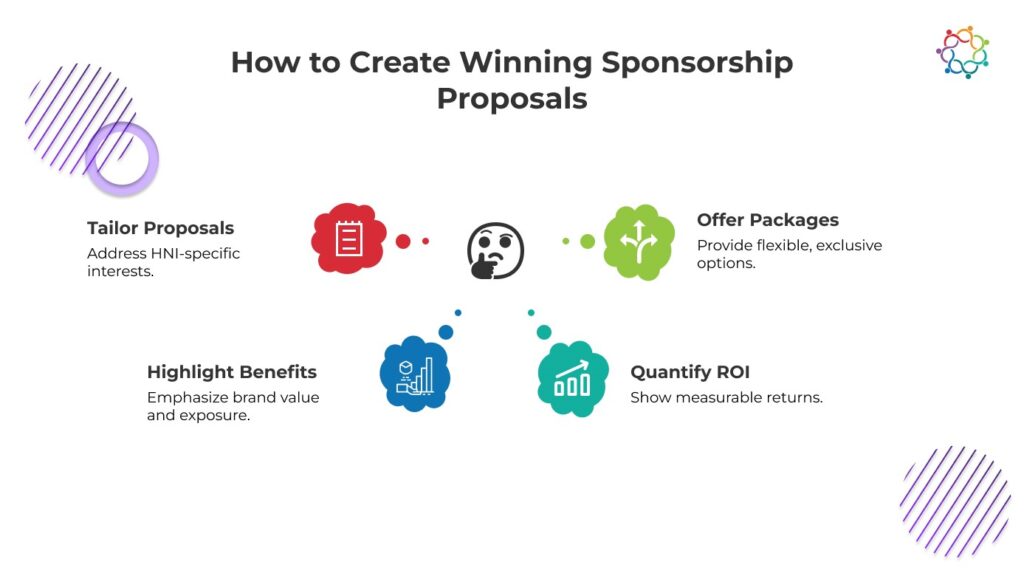
A well-crafted sponsorship proposal is essential to capture the attention of HNIs.
Generic pitches won’t work for HNIs. Research their interests and create personalized proposals that address their specific goals, values, and passions.
Be clear about what they stand to gain. Whether it’s brand visibility, networking opportunities, or philanthropic alignment, articulate the benefits convincingly.
HNIs appreciate measurable outcomes. Include data-driven projections, such as audience reach, demographic alignment, or social media impressions, to showcase potential returns.
Offer tiered sponsorship packages with distinct perks. For example:
Securing sponsorship is just the beginning—maintaining strong relationships ensures long-term success.
HNIs value individualized attention. Tailor your communication to their preferences, whether it’s formal proposals, casual conversations, or face-to-face meetings.
HNIs appreciate exclusivity. Offer perks like backstage access, private networking opportunities, or one-on-one interactions with keynote speakers. These unique experiences set your event apart and make the sponsorship feel personal.
The relationship shouldn’t end once the event is over. Send personalized thank-you notes, share event highlights, and provide a report showcasing the impact of their sponsorship. Regular touchpoints ensure they stay engaged for future opportunities.
Technology can simplify the sponsorship process, improve communication, and provide valuable insights.
Streamline the sponsorship process with platforms that track deliverables, deadlines, and ROI metrics, ensuring a smooth experience for HNIs.
Use data to showcase the immediate impact of sponsorships. For instance, track mentions, clicks, or audience interactions during the event and share updates with sponsors.
When working with HNIs, maintaining integrity is paramount.
Be transparent about what the sponsorship entails—both in terms of benefits and obligations. Ambiguity can lead to misunderstandings and erode trust.
Avoid conflicts of interest or partnerships that might damage your event’s credibility. Ensure the HNI sponsor’s values align with the event’s mission and audience expectations.
Deliver on every promise made in the sponsorship agreement. Whether it’s branding opportunities or networking perks, honoring commitments is essential to maintaining trust.
Samaaro, a cutting-edge event marketing platform, is designed to empower event planners with tools to attract and manage sponsors effectively. From crafting tailored proposals to tracking ROI in real-time, Samaaro helps you build strong, data-driven sponsorship partnerships that deliver lasting value.
High-net-worth individuals can be game-changers for event sponsorship. By understanding their motivations, crafting compelling proposals, and building strong relationships, event planners can secure valuable partnerships that drive success.
Attracting HNIs requires strategy, dedication, and a personalized approach, but the rewards are well worth the effort.
Ready to transform your sponsorship strategy? Samaaro is here to help. Book a demo or start your free trial today, and discover how our platform can empower you to secure high-value sponsorships and create impactful events.
In event planning, success often hinges on more than just creative ideas and flawless execution—it depends on the quality of partnerships formed along the way. Among these, the relationship with event vendors is critical. Vendors provide the goods and services that turn concepts into reality, from audiovisual equipment and catering to decor and transportation.
Strong vendor relationships not only ensure smooth event execution but also contribute to a higher-quality experience for attendees. Here’s how to build and maintain successful partnerships with event vendors to create memorable events.
Reliable vendors deliver high-quality services on time, minimizing last-minute hiccups and helping maintain the event’s reputation.
A strong relationship fosters open communication, making it easier to collaborate, troubleshoot, and adapt to changes.
Long-term partnerships often lead to cost savings through loyalty discounts, preferential treatment, and efficient workflows.
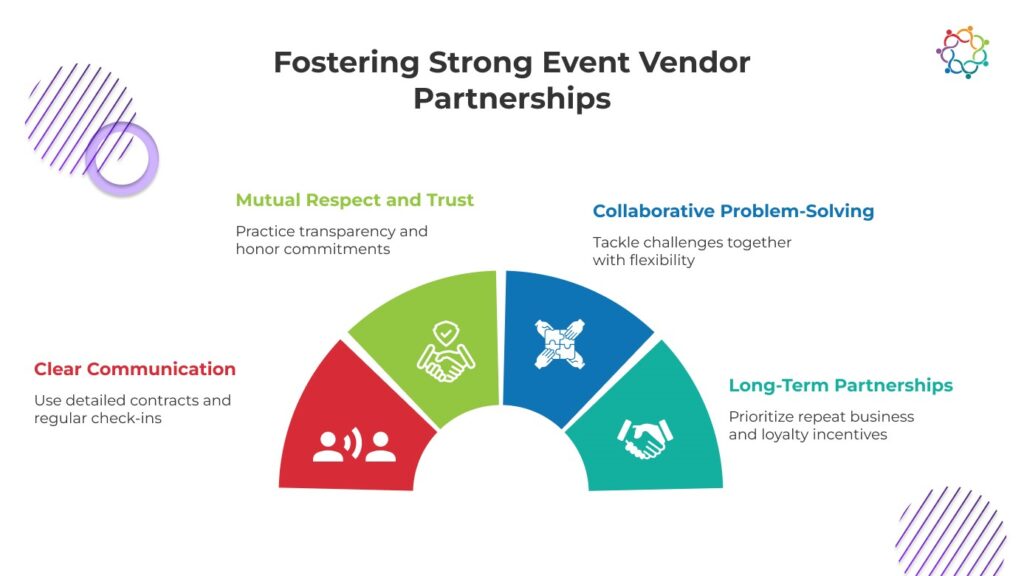
Effective communication is the cornerstone of any successful partnership.
Trust and respect are essential for any enduring partnership.
No event goes entirely according to plan, so being adaptable is key.
Strong, long-term relationships with vendors lead to consistency and trust over time.
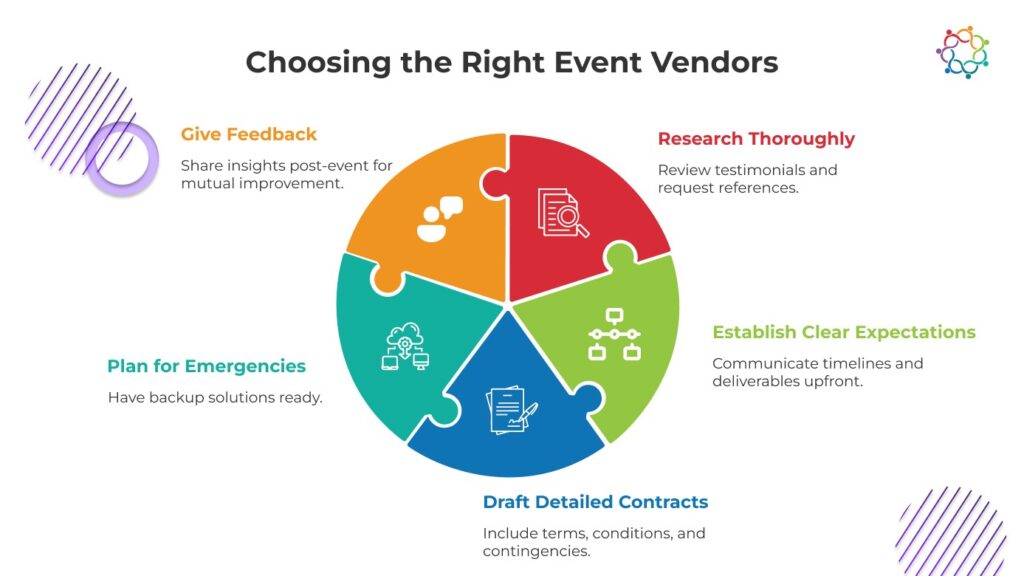
Before committing, research potential vendors to ensure they meet your needs.
A strong contract protects both parties and sets the foundation for a successful partnership. Include details like:
Events can be unpredictable, so always have a backup plan.
After the event, review vendor performance.
Event vendors are more than just service providers—they’re partners in your success. By building strong, respectful relationships, you can ensure seamless collaboration, deliver outstanding events, and foster loyalty that benefits both parties.
If you’re ready to take your event planning to the next level, Samaaro is here to help. Book a demo or start your free trial today, and discover how our platform can empower you to create exceptional events through seamless vendor collaboration.
In the ever-evolving world of marketing, events have become more than just gatherings; they’re pivotal touchpoints for engaging audiences, building brand awareness, and driving business growth. At the helm of these events is the event director—a professional whose role has shifted from logistical overseer to a strategic partner in marketing success.
Event directors are no longer confined to managing timelines and budgets. They are integral to crafting experiences that align with marketing objectives and amplify a brand’s message. Here’s a closer look at their responsibilities, challenges, and best practices to excel in this critical role.
Today’s event directors operate at the intersection of strategy, creativity, and execution. Their work directly impacts marketing outcomes, making them indispensable collaborators for marketing teams.
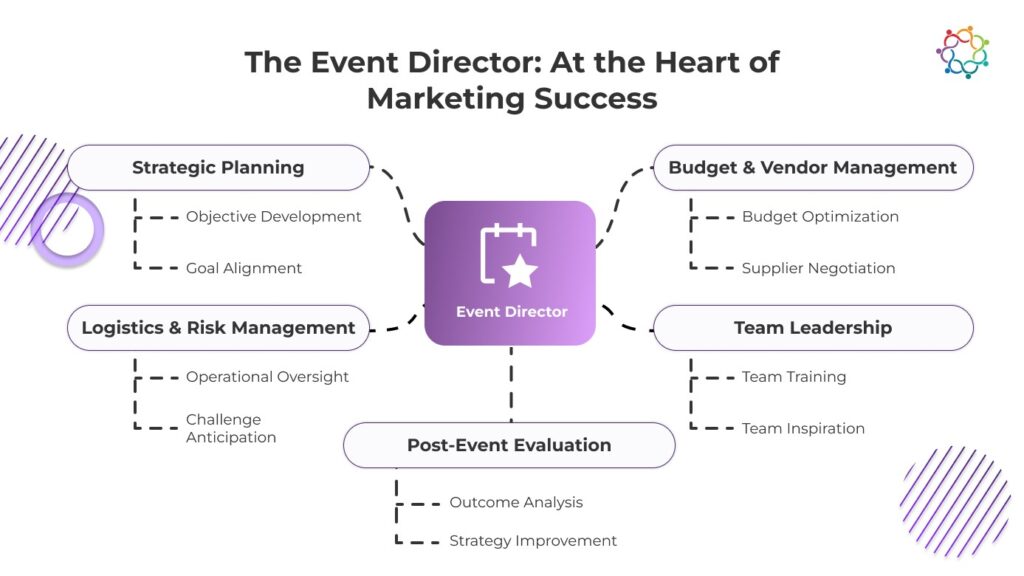
An event director’s journey begins with strategic collaboration.
Budgeting is a cornerstone of successful event planning.
A seamless event depends on reliable partners.
Effective event execution relies on cohesive teams.
Attention to detail is key to flawless execution.
Anticipating and addressing risks ensures event success.
The event director’s work doesn’t end when the lights go out.
Event directors must strike a balance between creating unique, memorable experiences and adhering to budgetary and logistical realities.
From marketing teams and clients to vendors and attendees, event directors juggle diverse expectations and ensure alignment among all parties.
Even the most meticulously planned events can face unforeseen hurdles, requiring quick thinking and adaptability.
Event directors must continuously evolve by adopting new technologies, trends, and best practices to stay competitive and relevant.

Clear communication ensures alignment and minimizes misunderstandings.
Using data to guide decisions enhances event outcomes.
Strong professional relationships are the backbone of successful events.
Staying ahead of the curve requires ongoing professional development.
Event directors rely on powerful tools to streamline planning and enhance impact. Samaaro, an all-in-one event marketing platform, provides solutions tailored to event professionals’ needs. From managing attendee data to tracking event performance, Samaaro empowers directors to focus on creating exceptional experiences.
The event director’s role is no longer limited to logistics; it’s a strategic position that drives marketing success. By mastering responsibilities, navigating challenges, and implementing best practices, event directors can create impactful events that align with business goals.
If you’re ready to elevate your event strategy, let Samaaro be your trusted partner. Book a demo or start your free trial today, and discover how Samaaro can help you achieve marketing success through exceptional events.
When the dust settles after an event, the real work begins: analyzing its success. Was the event a hit with attendees? Did it generate meaningful leads? Did the outcomes justify the investment? The answers lie in the metrics. Measuring event performance isn’t just about crunching numbers—it’s about unlocking insights that can guide your future strategy.
Here’s a detailed guide on the metrics that matter, how to track them, and how to use them to improve your event marketing outcomes.
Tracking event metrics goes beyond proving ROI. It helps you:

Engagement metrics help assess how well your event resonated with attendees.
For many events, leads are the ultimate goal. Track these metrics to measure lead quality and conversion efficiency.
ROI is a critical metric for proving the value of your event.
NPS is a widely used metric to measure customer satisfaction and loyalty.
To track these metrics effectively, you’ll need the right tools.
Platforms like Samaaro make it easy to track attendance, session participation, and lead generation in real time.
Customer Relationship Management (CRM) tools help manage and track leads. Integration with event management software ensures a seamless flow of data for follow-ups and reporting.
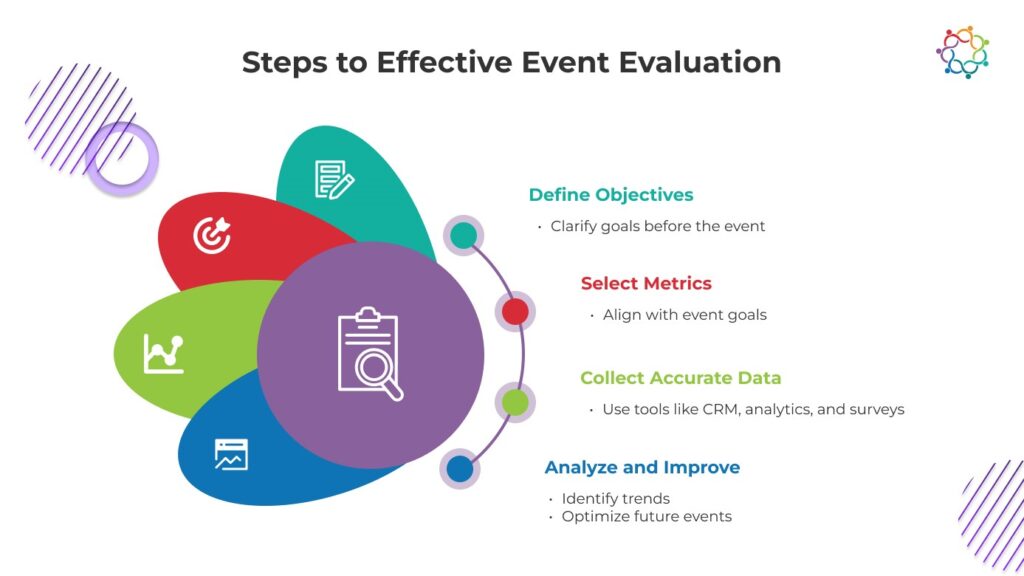
Before the event, define specific goals. For example:
Align metrics with your goals. If lead generation is your priority, focus on metrics like lead volume, quality, and conversion rates.
Ensure that your data collection methods are reliable. Use tools like QR code scanners, RFID badges, or event apps to capture attendee activity without errors.
After the event, analyze your data to identify trends and insights. For example:
Use your findings to refine future events. If attendees loved a particular speaker or format, consider replicating it. If feedback highlighted logistical issues, address them next time.
Tracking event performance is easier with the right partner. Samaaro’s event marketing platform provides powerful analytics tools to track attendance, engagement, and lead generation in real time. With seamless integration into your CRM, you can follow up with leads efficiently and prove ROI to stakeholders.
Events are a significant investment, and measuring their success is essential for maximizing returns. By focusing on key metrics like attendance, engagement, lead quality, and ROI, you can uncover actionable insights that drive continuous improvement.
Data-driven decisions aren’t just a buzzword—they’re the key to ensuring your events are impactful and aligned with your business goals.
Ready to transform your event marketing strategy? Explore the power of Samaaro for streamlined data collection and actionable insights. Book a demo or start your free trial today and see how metrics can drive your event success.
Events offer unparalleled opportunities for your sales team to connect with potential customers, demonstrate products, and close deals. However, simply showing up isn’t enough. Success at events depends on equipping your sales team with the tools, training, and support they need to maximize their impact. This is where sales enablement becomes critical.
By aligning preparation, technology, and strategy, you can empower your sales team to turn every interaction into an opportunity for meaningful engagement. Here’s a comprehensive guide to sales enablement at events, ensuring your team is set up for success.
Sales enablement is about more than just training—it’s about equipping your team with the resources and strategies they need to succeed. At events, where opportunities are time-sensitive and competitive, sales enablement plays a pivotal role. It ensures your sales team is:
The result? A confident, capable team that can make the most of every conversation and opportunity at an event.

Preparation is the foundation of sales success. Equipping your team before the event ensures they arrive ready to deliver.
Events can be chaotic, but with proper on-site support, your sales team can remain focused and effective.
The event isn’t over when the doors close—what happens afterward is just as important. Effective follow-up ensures that the connections made at the event translate into sales.

Define what success looks like for your sales team at the event.
Evaluate your team’s performance and the overall impact of the event.
Gather feedback from your sales team and attendees to identify areas for improvement.
Encourage your sales team to work together and share insights.
Sales enablement doesn’t have to be overwhelming. Tools like Samaaro, an event marketing platform, simplify the process by providing centralized resources and seamless integration with your sales workflow. From pre-event preparation to post-event follow-up, Samaaro empowers your sales team to succeed.
Event-based sales enablement is about more than just preparing your team—it’s about empowering them to deliver their best at every step. By focusing on training, tools, and support, you can transform your sales team into a powerhouse that drives results.
With the right strategies and resources in place, your team can build meaningful connections, capture high-quality leads, and contribute to a successful event outcome.
Ready to take your sales enablement to the next level? Explore the possibilities with Samaaro—a platform designed to optimize event marketing and empower sales teams. Book a demo or start your free trial today, and see how Samaaro can help you achieve your event goals.
Effective event marketing begins with compelling materials that capture attention and inspire action. From email invitations to printed flyers, the design and messaging of these materials can significantly influence your event’s success. They’re not just tools to inform your audience but opportunities to excite and engage them, setting the stage for a memorable experience.
Let’s explore how to create event marketing materials that not only look great but also communicate your event’s value clearly and persuasively.
In today’s competitive landscape, visually appealing and informative materials are essential for standing out. The right marketing assets can:
Remember, your marketing materials are often the first interaction potential attendees have with your event. A strong first impression can make all the difference.
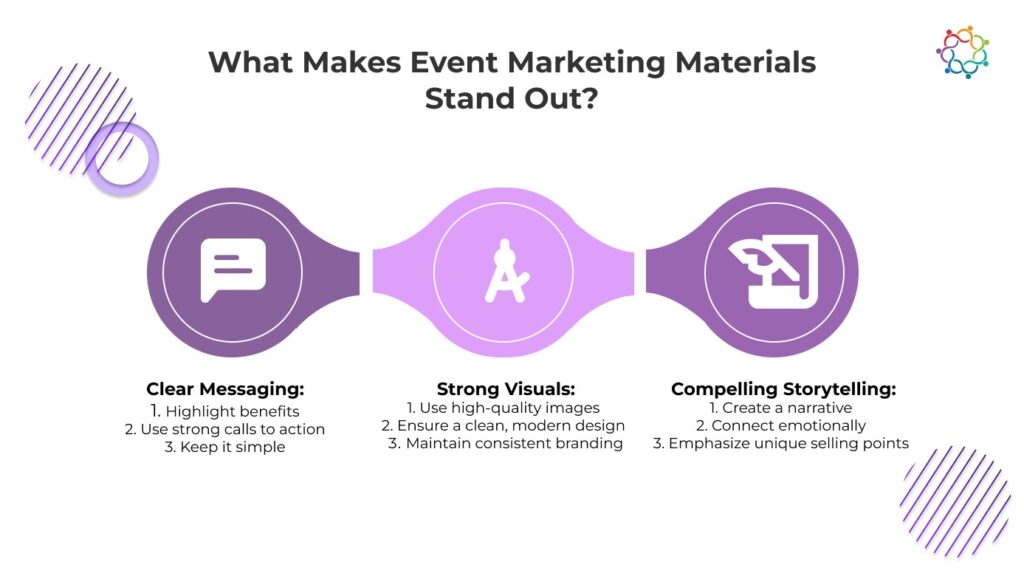
The foundation of any effective marketing material is its messaging. People are busy, so make your point quickly and clearly.
Humans are visual creatures, and eye-catching design can make your marketing materials more memorable.
Stories captivate audiences like nothing else. Craft a narrative that draws your audience in.
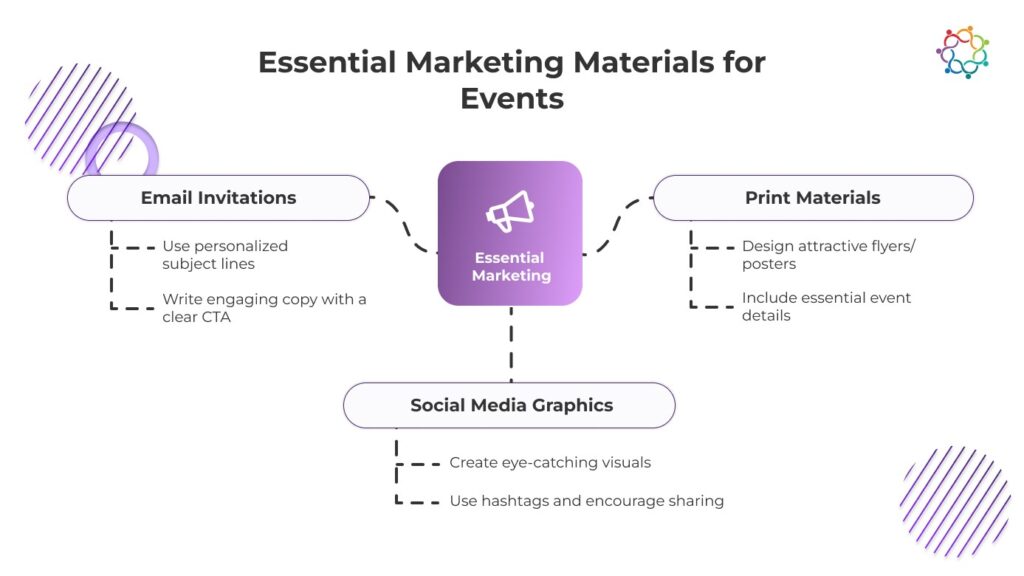
Email remains one of the most effective channels for event promotion, but standing out in a crowded inbox is no easy feat.
Social media is a powerful tool for creating buzz around your event. Your visuals should be as dynamic as the platforms themselves.
Despite the dominance of digital media, print materials still hold value, especially for local events or high-touch audiences.
Effective marketing starts with understanding who you’re speaking to. Consider their preferences, pain points, and what they hope to gain from your event.
Don’t settle on the first draft. A/B test different designs, headlines, and CTAs to find what resonates most with your audience.
Track how each piece of marketing material performs. Metrics like email open rates, social media engagement, and QR code scans can provide insights for future campaigns.
Brand consistency across all marketing materials ensures a cohesive and professional look. It also reinforces brand recognition, which can build trust over time.
Designing impactful event marketing materials doesn’t have to be overwhelming. With tools like Samaaro, an event marketing platform, you can seamlessly create, distribute, and track your materials. Samaaro’s features allow you to manage everything from personalized email campaigns to branded event assets, ensuring your marketing efforts deliver measurable results.
Compelling event marketing materials are the backbone of successful event promotion. By focusing on clear messaging, strong visuals, and storytelling, you can capture your audience’s attention and inspire them to take action.
Whether you’re sending out email invitations, sharing social media posts, or distributing print flyers, remember to keep your audience at the center of your design and messaging decisions.
Take your event marketing to the next level with Samaaro—a platform designed to simplify the process and maximize impact. Book a demo or start your free trial today, and see how Samaaro can help you create marketing materials that resonate and drive results.
In the fast-paced world of event marketing, success often hinges on your ability to deliver seamless, engaging experiences. Event apps have become indispensable tools for achieving this, transforming how marketers plan, execute, and analyze their events. These apps not only simplify event logistics but also elevate the attendee experience by fostering engagement and personalizing interactions.
If you’re not yet leveraging an event app, it’s time to reconsider. Let’s dive into the essential features that every marketer should look for when choosing the right event app.
Event apps have evolved far beyond basic scheduling tools. They’re now comprehensive platforms designed to connect people, streamline processes, and generate actionable insights. With the right event app, marketers can:
In short, a well-designed event app empowers marketers to focus on what truly matters—creating memorable and impactful events.
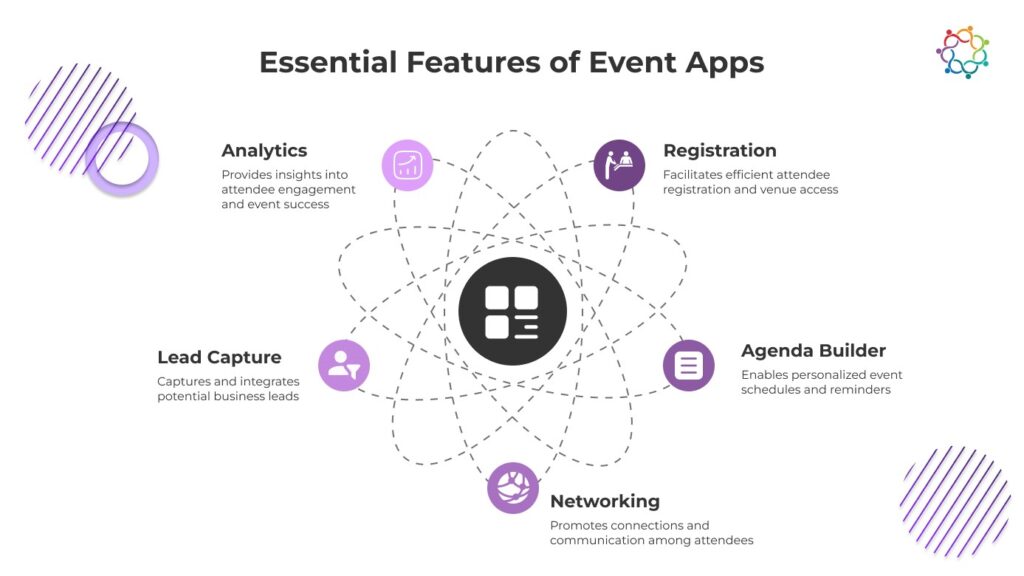
The features you choose in an event app can significantly impact your event’s success. Here are the must-have functionalities to consider:
The registration process sets the tone for your event. A smooth and intuitive system can leave a positive first impression while capturing critical attendee data.
An agenda builder is one of the most impactful ways to personalize the attendee experience.
Networking is a cornerstone of any successful event, and your app should facilitate meaningful connections.
Lead generation is a top priority for many marketers, and the right app can simplify this process.
To gauge the success of your event, analytics are indispensable.
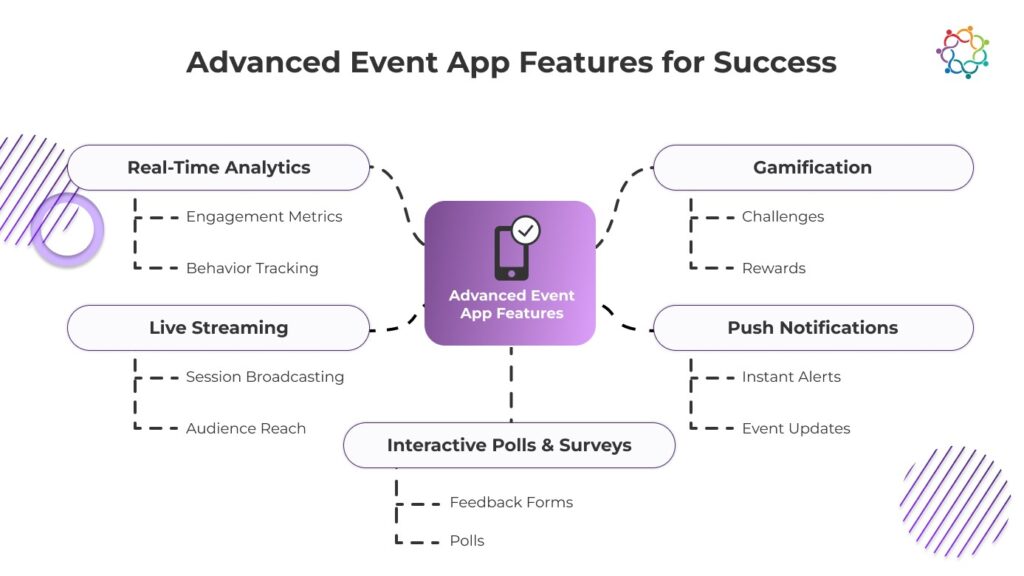
While the core features above are essential, here are a few additional functionalities that can add even more value to your event app:
Encourage participation and engagement with challenges, leaderboards, and rewards. Gamification can make the event experience more enjoyable while driving attendee interactions.
Capture real-time feedback by incorporating live polls and surveys into your sessions. Use this data to adjust programming on the fly or to enhance future events.
Ensure attendees stay informed with timely updates, reminders, and alerts. Whether it’s announcing a change in schedule or promoting a sponsor, push notifications are a direct line to your audience.
Allow attendees to interact with speakers in real time through live Q&A sessions. This feature boosts engagement and makes sessions more dynamic.
With so many event apps on the market, selecting the right one can feel overwhelming. Here’s what to consider:
Ensure the app has all the essential features your event requires, from registration and agenda building to analytics and networking tools.
The app should be intuitive and easy to navigate, both for attendees and event organizers. A clunky interface can detract from the overall experience.
Look for apps that integrate seamlessly with your existing tools, such as CRM platforms, marketing automation software, and payment gateways.
Choose an app that fits within your budget while delivering maximum value. Don’t compromise on essential features for the sake of cost savings.
Samaaro is one such platform that stands out in the crowded marketplace. It offers a suite of features tailored to marketers’ needs, ensuring a seamless event experience from start to finish.
Event apps are no longer optional in today’s marketing landscape—they’re a necessity. From simplifying event management to enhancing attendee engagement, these apps have become indispensable tools for modern marketers.
By leveraging features like personalized agendas, real-time analytics, and robust networking tools, you can create events that resonate deeply with your audience and deliver measurable results.
Ready to take your event marketing to the next level? With Samaaro, you’ll have access to cutting-edge tools designed to streamline your processes and maximize ROI. Book a demo or start your free trial today, and discover how Samaaro can help you create unforgettable event experiences.
Event marketing has evolved dramatically over the years, moving from intuition-driven decisions to strategies deeply rooted in data. In today’s competitive landscape, where every interaction counts, leveraging event data can transform your campaigns and deliver measurable success. From improving attendee experiences to optimizing lead generation, data empowers marketers to make smarter, more impactful decisions.
Let’s explore how data-driven event marketing can unlock new levels of success and why collecting, analyzing, and using event data should be at the heart of your strategy.
Data is the backbone of modern event marketing. It helps answer critical questions: Who are your attendees? What did they enjoy? What didn’t resonate? More importantly, it provides actionable insights that can shape future events, ensuring they are more engaging and impactful.
When used effectively, data can:
In short, data turns guesswork into certainty, giving marketers the tools they need to continuously refine and elevate their events.
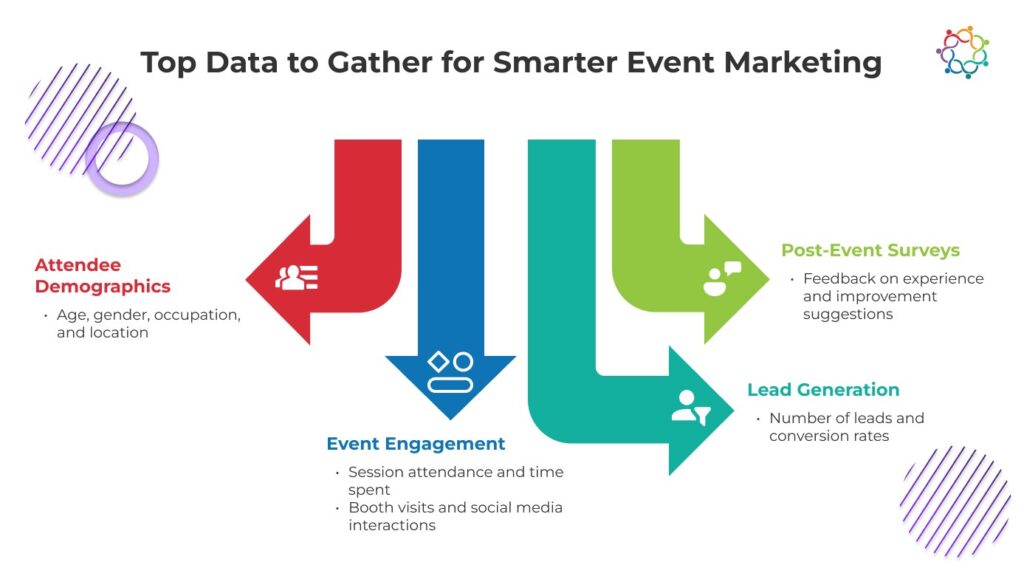
To fully harness the power of data, it’s essential to focus on the right metrics. These key data points will provide a comprehensive understanding of your event’s performance:
Understanding who your attendees are is the foundation of data-driven event marketing. Collect information such as:
This data allows you to tailor content, sessions, and activities to meet the needs of your audience.
Engagement metrics reveal how attendees interacted with your event. Track:
These insights highlight which aspects of your event resonated most with your audience.
One of the primary goals of most events is to generate high-quality leads. Key metrics include:
By understanding the quality of leads generated, you can assess the event’s impact on your business goals.
Direct feedback from attendees is invaluable. Surveys can provide insights into:
Attendee feedback helps refine future events and ensure you’re meeting their expectations.
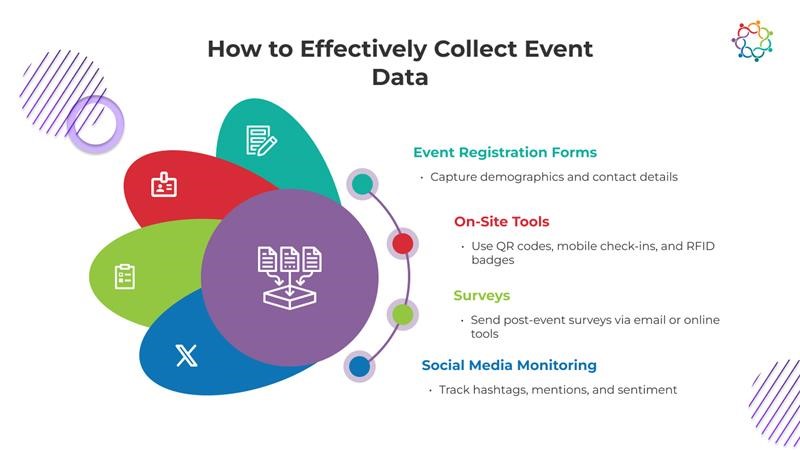
Data collection is as much about the method as it is about the metrics. Using the right tools and techniques ensures accuracy and completeness:
Registration is often the first point of contact with attendees, making it a prime opportunity to gather data. Use forms to collect basic demographic information and preferences. Customize fields to capture details relevant to your event objectives.
Events provide numerous opportunities for on-site data collection, such as:
Send surveys via email or use online tools to collect post-event feedback. Keep surveys concise and focused to maximize response rates.
Track event-related hashtags, brand mentions, and attendee sentiment on social media platforms. This not only provides engagement metrics but also gives insights into how your event was perceived.
Collecting data is only the first step. The real value lies in analyzing it to uncover actionable insights.
Dive into the data to understand your attendees better:
By identifying trends, you can refine your event strategies to align with audience preferences.
Event marketing is an investment, and data helps you measure its return. Calculate:
Understanding ROI demonstrates the event’s value to stakeholders and secures buy-in for future initiatives.
Use data to segment attendees based on their behavior, preferences, and demographics. This allows you to create targeted marketing campaigns and personalize communications, increasing the likelihood of conversions.
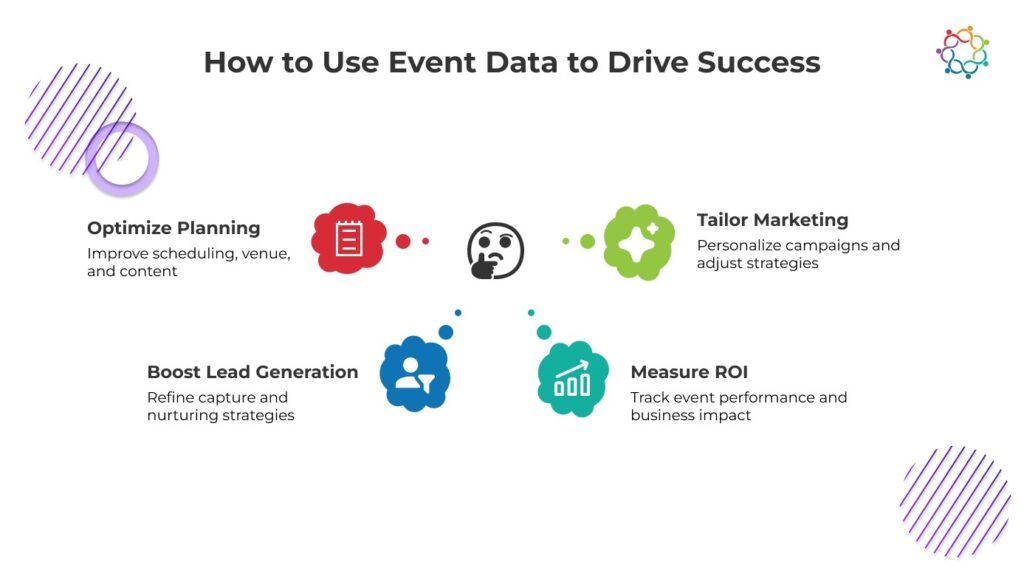
The insights gained from analyzing event data should directly influence your future event planning and marketing strategies:
Use attendee feedback and engagement data to improve logistics, from venue selection to session timing. Tailor your speaker lineup and content based on what resonated most with attendees.
Refine your lead capture strategies based on data insights. For instance, if QR codes outperformed manual forms, prioritize their use. Nurture leads more effectively by segmenting them based on quality and behavior.
Data-driven insights allow you to evaluate the performance of your marketing campaigns. Track which channels drove the most registrations and adjust your budget accordingly.
Data-driven event marketing is no longer optional—it’s essential. By collecting the right data, analyzing it effectively, and using insights to refine your strategies, you can create events that not only meet but exceed expectations.
Samaaro is designed to help you unlock the full potential of data-driven event marketing. With advanced data collection, analysis tools, and a seamless user experience, Samaaro makes it easy to measure success and optimize your efforts.
Ready to take your event marketing to the next level? Book a demo or start your free trial of Samaaro today, and discover how data can transform your events into unforgettable experiences.
Event marketing has entered a new era, where human connection and cutting-edge technology work in tandem to create truly transformative experiences. After years of rapid evolution, the resurgence of in-person events signals a profound shift in how we connect, communicate, and cultivate relationships. But in this new landscape, it’s not just about gathering people in a room; it’s about creating meaningful, memorable interactions.
This blend of human connection and data-driven insights is reshaping event marketing as we know it. Marketers are leveraging advanced tools to better understand their audiences while never losing sight of the power of face-to-face interactions. Let’s explore how these forces are shaping the future of event marketing and why they’re essential to your strategy.
At its core, event marketing has always been about people. The conversations, the handshakes, the shared laughter—all of these moments create bonds that can’t be replicated elsewhere. Human connection is the heart of every great event.
Even in today’s tech-savvy world, there’s something irreplaceable about meeting in person. Body language, tone of voice, and spontaneous discussions foster a sense of trust and understanding that digital communication simply can’t match. Whether it’s building rapport with potential clients or deepening relationships with existing partners, face-to-face interactions lay the foundation for long-lasting connections.
Events have the power to bring people together around shared goals, interests, or challenges. For businesses, this sense of community is invaluable. Attendees don’t just walk away with knowledge—they leave feeling a sense of belonging. And that’s what builds brand loyalty. By designing spaces and activities that encourage interaction, you create an environment where relationships can flourish naturally.
Great events don’t just inform; they engage the senses. From the aroma of fresh coffee to the buzz of a live performance, in-person events captivate attendees in ways that stick with them long after they leave. Sensory engagement leaves a lasting impression, turning your event into more than just a meeting—it becomes an experience.

While human connection is at the heart of events, data is the brain. The ability to collect, analyze, and act on data has revolutionized event marketing, enabling businesses to create highly personalized and impactful experiences.
The first step in data-driven event marketing is identifying the metrics that matter most. Are you measuring attendance, engagement levels, or lead conversions? Perhaps ROI is your focus. With the right tools, collecting this data is easier than ever. Event technologies like mobile apps and check-in kiosks provide real-time insights, capturing everything from session participation to booth visits.
Once collected, this data becomes a goldmine for analysis. Patterns emerge, helping you understand what worked and what didn’t. Did a particular keynote draw more attendees than others? Was a certain booth more popular? With these insights, you can refine your approach for future events.
Today’s attendees expect more than cookie-cutter experiences—they want events tailored to their preferences. This is where data becomes invaluable. By analyzing attendee interests and behaviors, you can deliver personalized content, recommend sessions, or even suggest networking opportunities.
Imagine sending an attendee a custom agenda based on their industry or job role. Or suggesting breakout sessions that align with their professional goals. These small touches create a sense of value and make attendees feel seen and understood.
The work doesn’t stop when the event ends. Post-event analysis is critical to understanding your success and identifying areas for improvement. Attendee feedback, engagement metrics, and ROI calculations all come into play here.
Was your registration process smooth? Did attendees find the sessions valuable? Use these insights to continuously refine your strategy, ensuring each event is better than the last.

Technology is no longer an add-on for events; it’s a driving force behind their success. From streamlining operations to enhancing the attendee experience, the right tools can make all the difference.
Mobile apps have become indispensable in event marketing. They allow attendees to customize their schedules, receive real-time notifications, and even network with others—all at their fingertips. For organizers, apps provide a seamless way to collect data and deliver a more personalized experience.
Platforms like Samaaro take this a step further by enabling personalized agendas, helping attendees discover relevant sessions and activities effortlessly. These tools don’t just enhance convenience—they elevate the entire event experience.
Gone are the days of long registration lines and cumbersome processes. QR codes have streamlined check-ins, allowing attendees to breeze through with just a scan. Beyond registration, QR codes can also be used to capture leads, provide session access, and enable contactless sharing of information.
Efficient check-ins set the tone for the rest of the event. Onsite check-in tools not only speed up the process but also collect valuable data about attendees. This information can be used to personalize interactions, ensuring each guest feels welcomed and valued.
Artificial intelligence is transforming event marketing in exciting ways. Predictive analytics help organizers anticipate attendee needs, from room capacities to content preferences. Chatbots provide real-time support, answering questions and guiding attendees through the event. These technologies make events smarter, smoother, and more engaging.
The future of event marketing is all about balance—merging the timeless power of human connection with the precision of data-driven insights and technological innovation. By focusing on building relationships, creating memorable experiences, and leveraging the latest tools, marketers can deliver events that leave a lasting impact.
Samaaro stands at the forefront of this evolution, offering a comprehensive platform that combines personalization, engagement, and data analytics. Whether it’s streamlining operations, enhancing attendee experiences, or maximizing ROI, Samaaro empowers businesses to make every event a success.
Ready to elevate your event marketing strategy? Book a demo or start your free trial of Samaaro today, and experience the future of event marketing firsthand.

Built for modern marketing teams, Samaaro’s AI-powered event-tech platform helps you run events more efficiently, reduce manual work, engage attendees, capture qualified leads and gain real-time visibility into your events’ performance.
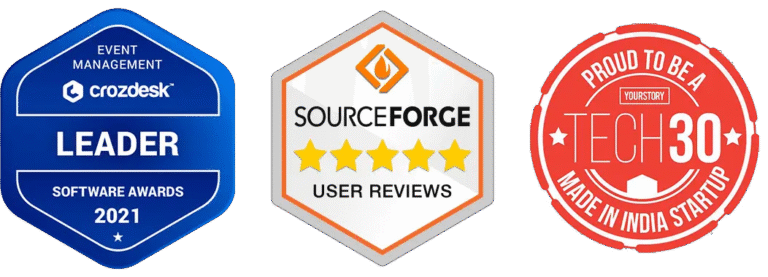
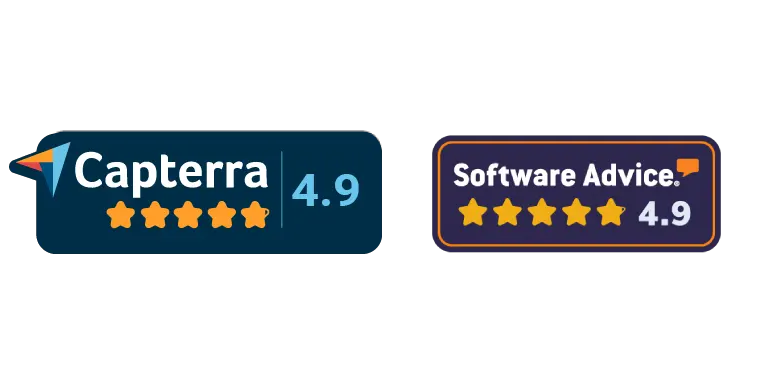
© 2025 — Samaaro. All Rights Reserved.